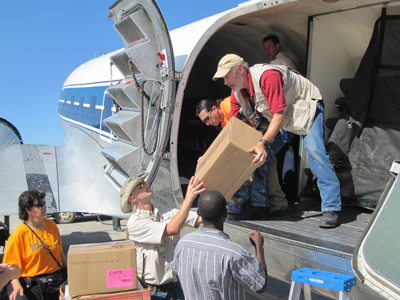
News
MAF pilot feels optimism about Haiti
 |
MAF pilot feels optimism about Haiti
Jason Krul was literally thrown from his couch in the earthquake in Haiti of Jan. 12. But he is eager to go back and help the devastated country.
October 6, 2009 By Colleen Cross
Jan. 26, 2010 – Jason Krul was literally thrown from his couch in the
earthquake in Haiti of Jan. 12. But he is eager to go back and help the
devastated country.
Just under a year and a half ago, Jason, his wife
Wilhelmina, and their son Jayden, moved down to the Port-au-Prince area.
Missionaries for Mission Aviation Fellowship, Jason worked there as a pilot,
and Wilhelmina worked in an orphanage and volunteered in the community.
On the day of the earthquake, Jason, who was recovering from
a fever, got home from work at 4:30 and, tired, lay down on the couch. “The
next thing I remember,” he says, “I was lying in the middle of the floor. The
quake had thrown me . . . five to 10 feet right off the couch into the middle
of the living room floor.”
 |
|
John Woodberry, manager of MAF-US Disaster Response, hands |
He saw the television fly off the shelf, heard Wilhelmina
scream for their son, and rescued Jayden from the playroom. The quake left the
family unhurt, their house still standing, but with a collapsed security wall,
and broken water pipes and gas lines. It didn’t take long to realize that the
exterior doorway they were standing under wasn’t going to hold, and they simply
got out into the courtyard to weather the aftershocks with their neighbours.
For two days after the earthquake Jason pitched in at an
orphanage transformed into a medical clinic: he stitched up and bandaged
wounds, and relocated limbs. Having worked as a firefighter back in Chilliwack,
B.C., Jason was able to give medical aid, but was unprepared for the magnitude
of the need he witnessed.
“Adrenalin was going,” he remembers. With so many in need of
medical help and suffering severe trauma, it was difficult to prioritize
patients. The clinic was the only hope for some. “Scores and scores” of people
showed up, sometimes in pick-up trucks, only to be triaged. “It was tough,”
remembers Jason, and they did what they could, knowing this might be the only
treatment people would receive.
The Kruls were evacuated from Port-au-Prince on Friday, Jan.
16, grateful to escape the city’s mounting violence, along with non-essential
staff, families, and those who were ill or not immediately needed for the
relief effort. Four pilots stayed behind.
Civil aircraft weren’t allowed in, forcing the evacuees to
spend most of a day at the Port-au-Prince airport, unloading cargo, and waiting
for the Mission Flights International DC-3 to get clearance. The next day they
co-ordinated with the control tower to bring the airplane into the general
terminal – where MAF parks its own airplanes – instead of the clogged
international terminal.
MAF focuses its efforts
With his family temporarily settled in British Columbia,
Jason plans to head back to Haiti, possibly by plane out of Alberta, by the
middle or end of this week.
He says Mission Aviation Fellowship is helping in two major
areas of need. First, it is providing and installing logistics and
communications equipment at the airport, offloading the cargo, storing it, then
helping with its distribution. MAF recently flew in a VSAT satellite link that
is providing communications for many humanitarian organizations as well as the
U.S. military.
Secondly, as things settle, pilots are able to get clearance
to fly regionally, they are starting to fly in food, supplies and aid to the
Jacmel region in southern Haiti.
“The Canadian military is focusing some of their aid in
Jacmel, but they are not able to get their large Hercules planes in. They are
doing most of it by air drops or by helicopter, so MAF has been pretty vital in
flying our smaller airplanes into this airport.”
MAF is also helping to evacuate many missionaries, doctors
and aid teams from around the country. MAF picks them up, flies them into
Port-au-Prince airport and helps them co-ordinate with others to get out of the
country. Four planes remained in Haiti when Jason left, and more, including a
specially designed Kodiak out of Idaho, are being pressed into service.
He urges those wanting to help to make financial
contributions to a trustworthy organization that can get the supplies, food and
water Haiti need.
“Having lived there before the earthquake, I know that a lot
of aid does get to Haiti but it doesn’t get distributed by the right means and
it doesn’t actually get utilized in the right way. I have a lot of optimism
that . . . over the next few years we’ll be able to help this country with its
infrastructure and its poverty.
“Through this earthquake, Haiti is being remembered.”
To learn more about Mission Aviation Fellowship of Canada,
or to make a donation, visit http://www.mafc.org/.